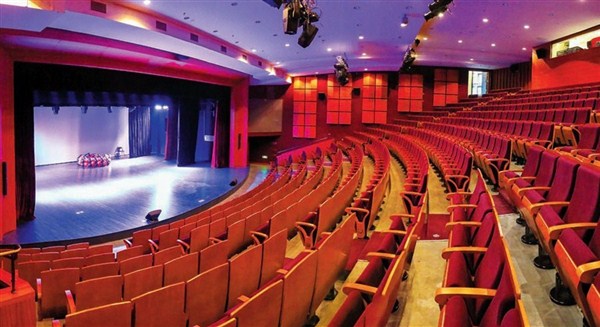
今日上海
83岁黄浦剧场盛装重开,承载上海文化记忆 - 2016年11月18日
Huangpu Theater restored to former glory

IN its 83-year history, the Huangpu Theater has not only witnessed the vicissitudes of Shanghai’s entertainment industry, but also played its own role in modern Chinese history. Now, after decades of neglect, the venue that’s credited as the first place to play the country’s current national anthem has just reopened after a seven-month renovation project.
Since late last month, the theater has hosted a series of cutting-edge shows, including the dystopian sci-fi drama “Lights” by Theater Ad Infinitum, the dance spectacle “Tiger” by Barrowland Ballet, and Tim Crouch’s Shakespeare-inspired solo show “I, Malvolio.”
The Huangpu Theater, sitting at the crossroads of Beijing Road E. and Guizhou Road, not far from the Nanjing Road Pedestrian Street, may be better remembered among older residents by its original name, the Jincheng Grand Theater.
Constructed in 1933, the theater was a venture by a local family of shipping magnates, the Lius, who were eager to invest in China’s burgeoning cinema industry. Designed by Tong Yue, one of the first generation of contemporary Chinese architects, the theater wowed local residents from the start with a mix of modern style and traditional Chinese elements.
Covering 1,050 square meters, the theater was equipped with advanced projection equipment and 1,786 comfortable seats. It first opened to public in February 1934 with the Chinese film “Rensheng” (Life) starring legendary actress Ruan Lingyu.
In its early days, the theater became known as a place to see patriotic Chinese films, says James Mao, assistant general manager of the Huangpu Theater. These included “Yuguang Qu” (Song of Fishing Light, 1934), “Xin Nuxing” (New Women, 1935), “Ren Zhi Chu” (The Beginning of Life, 1935) and “Malu Tianshi” (Angel on the Street, 1937), all of which are considered among the most influential Chinese films of the 1930s.
“The theater was described as the ‘palace of Chinese cinema’ in its prime. It seemed to have been common sense among Shanghai residents that the Jincheng Grand Theater was the place to go for Chinese films, while other venues like the Grand Cinema were for overseas movies,” says Mao. “And the tickets were like gold.”
The theater’s patriotic reputation was cemented in May 1935 when it premiered the film “Fengyun Ernu” (Children of Troubled Times), which featured the song “March of the Volunteers.” With music by Nie Er and lyrics by Tian Han, the song quickly spread throughout China, which was then fighting against the invading Japanese. It was selected as the temporary national anthem of the People’s Republic of China in 1949, a designation that was officially confirmed in 1982.
Sadly, composer Nie drowned the same year as the film’s premiere. Countless people swarmed to the theater to attend a memorial service in his honor. Once the seats were filled, many chose to stand outside to pay their respect.
Changing times
The Huangpu Theater underwent its first renovation in the 1950s. In 1957, it became the fixed venue for the Shanghai Huaiju Opera Troupe. It was also then renamed the Huangpu Theater by Premier Zhou Enlai, who wrote this new name in his own calligraphy.
But with stage space limited, the theater became a cinema again in the 1970s. It struggled in the 1980s, as the country’s reform and opening up policy brought fresh life to many industries; although not entertainment. In the early 1990s, its ground floor was transformed into a hardware mall, leaving the second floor open for small-scale film screenings and stage performances.
The turn didn’t come until early this year, when repairs began on the theater. To preserve the original look of the historical architecture, the repairs have left the building’s structure largely intact aside from a slight expansion of the stage on the second floor. There was also the addition of a studio theater on the first floor, according to Mao.
The drama theater on the second floor now has a capacity of 495 regular seats, making it suitable for medium-scale shows, chamber concerts and film screenings; while the studio theater with 339 removable seats is intended for more experimental shows and live concerts featuring more interaction between the performers and audience.
“I think the studio theater will be quite a highlight of our theater as there are not many of this type in Shanghai to accommodate small yet interesting performances,” says Mao.
Such shows will make up a large part of the theater’s opening season, which runs until January, he adds.
“Frankly speaking, we haven’t decided on a fixed orientation as to what our theater will bring. We want to put the authority in the hands of audiences,” says Mao.
Though most of the shows selected for this season are quite cutting-edge and mostly from overseas artists, the theater plans to stage classical music shows and children’s performances next year, with even more variety planned for later on.
Apart from providing tickets as low as 50 yuan (US$7.28), the theater has also launched a membership program to build up its audience. Any ticket-buyer can get a membership which they can use to enjoy up-graded services and related lectures.
“We are still exploring the market, and I think it will take at least one year for us to make the final decision,” says Mao.

